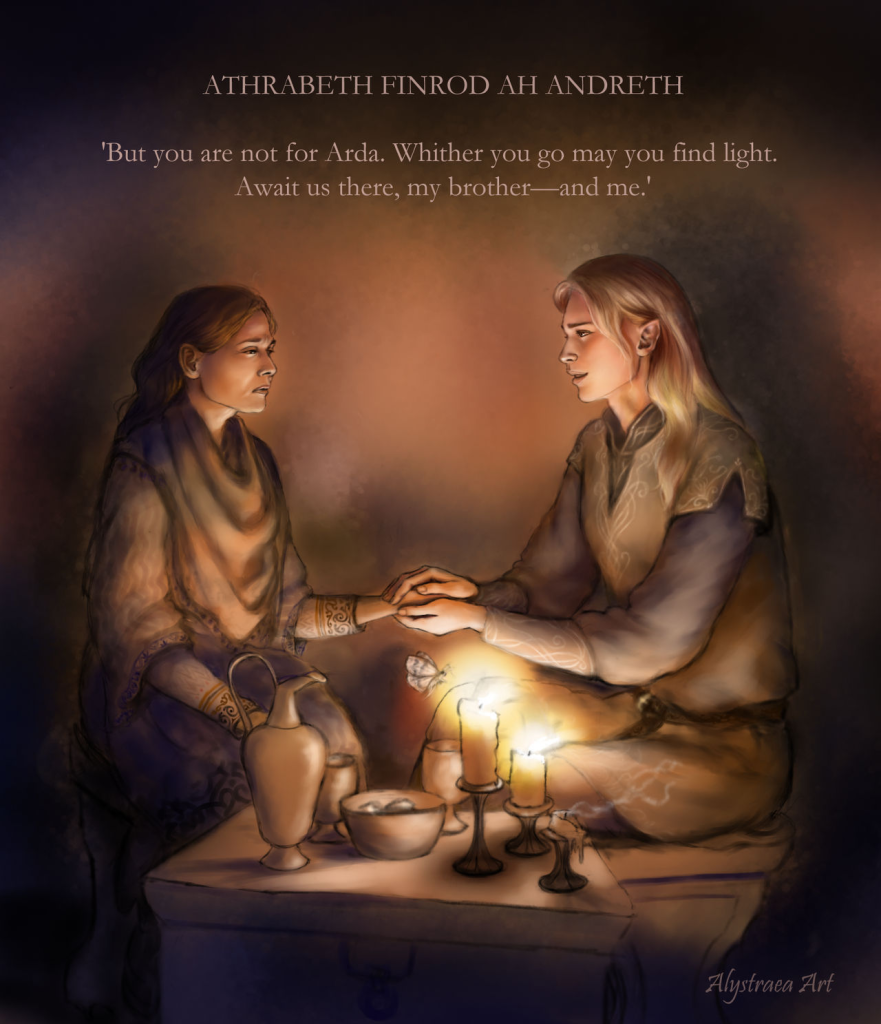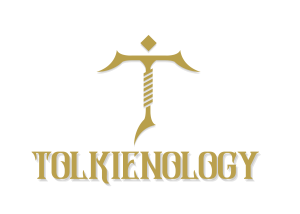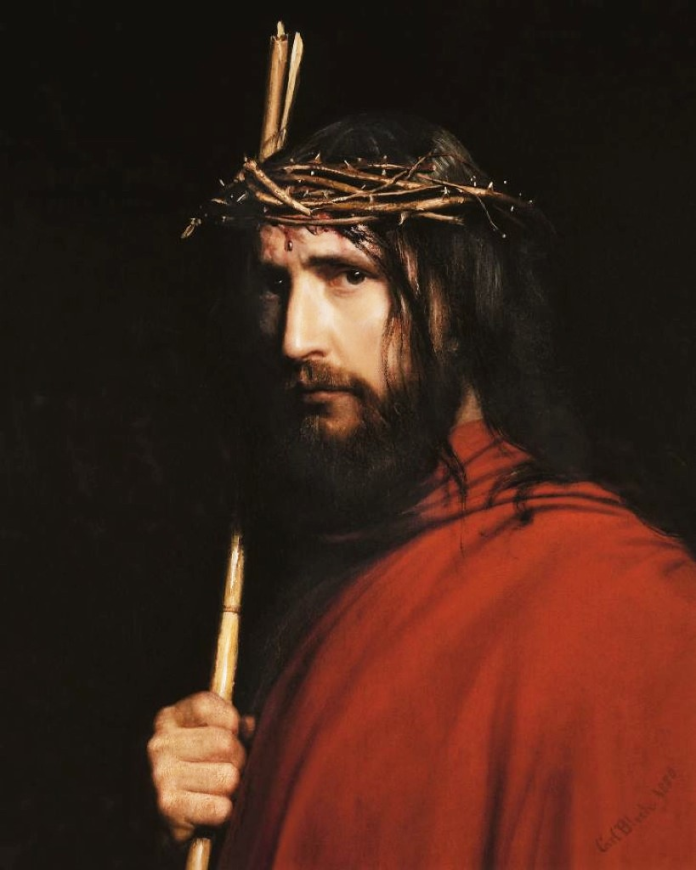The human heart lives on hope and love. Hope, when the thing loved is not present, love, when the beloved is present. We can hope for and love many things, all with different levels of importance. And anything we love, we consider good.
Hope and love are very much present throughout Tolkien’s legendarium. At the beginning, Eru desires that the Ainur awaken great beauty through the Music that helps to create the world. The Ainur hope to bring order to a chaotic cosmos when they descend to Ea. And all the while, throughout the history of Arda, all the personalities hope to attain some purpose, whether objectively good or evil. Yes, even Morgoth, albeit in a skewed manner, hopes and loves. He hopes to bring as much destruction as possible to Eru’s creation, and would ‘rest’ in a distorted state of love, having achieved such an end. At the defeat of Sauron in the Third Age, the free peoples of Middle-earth have achieved what they hoped for. Thus, they celebrate the downfall of Sauron, and their love for goodness and freedom is shown forth in the subsequent (temporary) cleansing of Middle-earth from evil. Finally, even at the end of history, when it is said that Turin Turambar is supposed to be the one who finally slays Morgoth and brings an end to the originator of evil, love for good and its final victory shows how the thread of love and hope runs all the way from the beginning to the end of creation. And what then?
“…I beheld as a vision Arda Remade; and there the Eldar completed but not ended could abide in the present for ever, and there walk, maybe, with the Children of Men, their deliverers, and sing to them such songs as, even in the Bliss beyond bliss, should make the green valleys ring and the everlasting mountain-tops to throb like harps”.

(Taken from: https://www.frlouis.com/archives/429/new-heaven-new-earth/)
These are the words of Finrod Felagund in the Athrabeth, where he holds dialogue with a wise woman named Andreth. They discuss hope along with several other matters. The quote above displays the ultimate hope of all the Children of Iluvatar. It shows what their hearts long for, what they would love, if it comes to pass. A world renewed, freed from the tyranny of evil. This is the vision behind all struggles against evil in Middle-earth. Andreth responds:
“Alas, lord!’ she said. “What then is to be done now? For we speak as if these things are, or as if they will assuredly be. But Men have been diminished and their power is taken away. We look for no Arda Remade: darkness lies before us, into which we stare in vain. If by our aid your everlasting mansions were to be prepared, they will not be builded now”.
Much of the conversation between Finrod and Andreth centres on the death of Men. Finrod holds that death is part of human nature, that Men were made so by Eru. Andreth is robust in her denial of this claim, saying that Men were not so in the beginning, but made for life everlasting in Arda. She says that it is Morgoth that has dealt a deadly stroke against humans, so that all members of the species die. Finrod finds this idea “a matter of dread”, so much so that he utterly refutes it – “None could have done this save the One [Eru]”.

(Taken from: https://audioboom.com/posts/7915388-finrod-and-andreth-special)
This does seem to make sense. Though Morgoth is angelic, or rather demonic, in power level, that power does not reach so far as to directly affect the spiritual natures of things. In other words, Morgoth can cast down mountains and fill in valleys, as we see in the Silmarillion, but he cannot strike directly at anything beyond what is physical. He cannot attack the human soul (or that of any other species) and change facets of its nature, at least not directly. This is my opinion, and that of Finrod, as seen above. The reason I think this is because of a story that we find outside of the legendarium, in the Book of Genesis. The Serpent does not directly cause Adam and Eve to die. Rather, he convinces them to do something that will bring death to them and their descendants, namely, eating the fruit of the Tree of Knowledge of Good and Evil. As we have seen above, in Tolkien, Finrod reasons that only the One, not Morgoth, could have made death a part of human nature. As to why, he further reasons that it must have been because of something Men did wrong (“How did ye anger Eru?”, to which Andreth responds, “We do not speak of this to those of other race”.). This avoidant answer suggests that there exists a sense of shame among Men about “whatever happened long ago”. It suggests a fall from the favour of Eru. A Fall from grace.
‘Middle-earth’,…is not a name of a never-never land without relation to the world we live in…imaginatively this ’history’ is supposed to take place in a period of the actual Old World of this planet” (The Letters of J.R.R. Tolkien, No. 165).
We cross from ‘fiction’ to reality. Perhaps a better word than fiction is mythology. Myths are not “lies breathed through silver”, as Tolkien’s friend C.S. Lewis once opined. The Fall is shrouded in the Athrabeth and therefore Andreth’s opinions about the original deathlessness of Men are possibly true. The Fall is presented clearly in the Book of Genesis, and here is a fundamental link between our Universe and Tolkien’s sub-created universe. In Genesis, we are shown that Adam and Eve are created to live continuously. It seems they would never die, unless they eat the forbidden fruit. If Adam and Eve were originally meant to never die, were Tolkien’s Men the same, as Andreth insists? The Athrabeth gives no answer, but elsewhere in Tolkien, we find the “Tale of Adanel”, also found in Morgoth’s Ring. In this tale, we are shown the very beginning of human history:
“Some say the Disaster happened at the beginning of the history of our people, before any had yet died. The Voice had spoken to us, and we had listened. The Voice said: ‘Ye are my children. I have sent you to dwell here. In time ye will inherit all this Earth, but first ye must be children and learn. Call on me and I shall hear; for I am watching over you.”
The opening sentence in Tolkien’s chronology of the lived history of Men refers to “the Disaster”. What is this Disaster? To answer that, it is first necessary to clarify that “The Voice” is Eru. He tells his children that they must learn about the Earth, and to call on him when they want something. He later adds that they must seek answers for themselves to become wise, rather than having him telling them everything they want to know – “For ye will have joy in the finding, and so grow from childhood and become wise. Do not seek to leave childhood before your time.”
A problem arises through the impatience of Men to understand the world and control it. They speak “less and less to the Voice”, and into this context Melkor the Morgoth appears, offering things to make their lives easier. He lies to them about the Voice, telling them it is the voice of the cosmic Dark, and that it is hungry for them. Ultimately, Melkor only continues to give his gifts to the Men if they accept him as their Lord, and then build him a temple, where they may make their petitions to him. At this point, all the humans have accepted Melkor’s rule: “...we spoke as he commanded, saying: ‘Thou art the Lord; Thee only we will serve. The Voice we abjure and will not hearken to it again.” It is interesting and evokes a sense of tragedy that Melkor’s response is “So be it!”, which is how the word “Amen” may be translated.

(Taken from: https://www.reddit.com/r/lotr/comments/14d7jcl/tale_of_adanel_cave_art_depiction_of_first_humans/)
This is the Disaster. At the beginning of their days, they “abjured”, or solemnly renounced Eru as their Lord. Instead of asking the Voice for guidance regarding the claims of Melkor when he first appeared, they are swayed by his easy gifts and promises of grandeur, if they would just listen to him. They become more and more dependent on him, so that they ultimately fear to leave him, and they take him for their Lord. They become addicted, slaves to evil. Later, Men learn of the consequence of their decision:
“The first Voice we never heard again, save once. In the stillness of the night It spoke, saying: ‘Ye have abjured Me, but ye remain Mine. I gave you life. Now it shall be shortened, and each of you in a little while shall come to Me, to learn who is your Lord: the one ye worship, or I who made him.”
Many Men live in dread of death from that time, believing still in the lies of Melkor regarding the Voice being “the darkness behind the stars”. So it is that we see the origin of the death of Men, and of their fear of it. As Finrod later guessed in the Athrabeth, it was Eru that decrees that Men should die, but Morgoth who caused them to fear this. He led them into turning their backs on Eru, like the Serpent made Adam and Eve turn away from God’s instruction and fall from His grace. It is worth noting that the Tale of Adanel does not explicitly say that Men die as a result of their abjuration of Eru. It says that life would be “shortened” from that time, suggesting that Men would always have been eventually called to the Halls of Eru through death, regardless of these events. It strikes me that this death could have been something similar to going to sleep, and indeed, the Silmarillion gives death the positive name, “the Gift of Men” (in Ainulindale). In Catholic theology, Mary’s death is sometimes referred to as the “Dormition” (Latin: “Dormire” – to sleep), a word which evokes this peaceful sense of falling asleep. Catholics hold that her soul was preserved from Original Sin by the gift of prevenient grace from Christ’s sacrifice on the Cross. Thus, she would not die for ‘normal’ reasons, death being due to the bodily deterioration that is a consequence of sin. If the Men in the Tale of Adanel had not yet sinned against Eru, then perhaps they too would have undergone a peaceful dormition, before waking in the Halls of Eru.
What does the death of Man have to do with the hope for an “Arda Remade”, then, mentioned above? As we have seen, Andreth wishes to escape death, and carries the fear of it that her ancestors had, because of the lies of Morgoth. Finrod is of a clearer mind on the matter, seeing that it is Eru that intends that Men should die. Eru wills to awaken great beauty through the Music, and so, create a beautiful, harmonious world. Finrod trusts in his knowledge of this, and so has estel (Sindarin – ‘hope’), that is founded on the notion that “no one may alter the Music” in Eru’s despite. Christians believe that “…all things work together for good for those who love God, who are called according to his purpose (Romans 8:28). God even brings greater good from evil. As we have seen, there is a “Fall” in Genesis, which Christians and Jews take to be a fall that really happened. And there is a fall in Tolkien, told of in the Tale of Adanel. Both events separate Men from God.
Jesus Christ is the re-uniter of Man to God, according to Christianity. This is in His very personhood, which contains both Divine nature and human nature. Everything Man goes through in a normal lifetime, He went through in His time walking the Earth, except for sin and its personal consequences. He even went through being executed and dying, “…For that which He has not assumed He has not healed; but that which is united to His Godhead is also saved (Gregory Nazianzen, Letter 101).” In taking on humanity, Jesus Christ healed human ailments, through His Divinity. He even healed death, since “love is strong as death (Song of Solomon 8:6)”. Stronger, it seems, as the Resurrection shows. Though the Fall wrought great evil on the human race, God brought the superlative good out of it. He not only heals us from sin and its effects, He lifts us beyond our original state of innocence, into His Divinity. And so, I would like to return quickly to an earlier quotation:
“ …I beheld as a vision Arda Remade; and there the Eldar completed but not ended could abide in the present for ever, and there walk, maybe, with the Children of Men, their deliverers…”
And briefly draw attention to another part of the conversation between Finrod and Andreth:
“ [Andreth] How or when should healing come?…To what manner of being shall those who see that time be re-made? To such questions only those of the “Old Hope”… have any guess of an answer”.
“ [Finrod] Who are they?”
“They say…that the One will himself enter into Arda, and heal Men and all the Marring from the beginning to the end”.
And finally, earlier in the conversation:
“…a fea [soul] which is here but a traveller [in the world] is wedded indissolubly to a hroa [body] of Arda; to divide them is a grievous hurt, and yet each must fulfil its right nature without tyranny of the other. Then this must surely follow: the fea [soul] when it departs must take with it the hroa [body]. And what can this mean unless it be that the fea [soul] shall have the power to uplift the hroa [body], as its eternal spouse and companion, into an endurance everlasting beyond Ea, and beyond time. Thus would Arda, or part thereof, be healed not only of the taint of Melkor, but released even from the limits that were set from it in the “Vision of Eru” of which the Valar speak”.

(Art by “Alystraea”. Taken from: https://www.deviantart.com/alystraea/art/Athrabeth-Finrod-ah-Andreth-849955645)
In other words, when Men die, their souls have the theoretical capacity to bring the body with them, beyond Arda. Due to the “Disaster”, however, their bodies remain in Arda, hence the need for burial or cremation. But if there were a man who was not affected by the Disaster, what then? All Men of Arda are affected by it, so the only way that would be possible is if he came from somewhere else. Somewhere beyond. Again, I quote: “They say…that the One will himself enter into Arda, and heal Men and all the Marring from the beginning to the end”.
‘Middle-earth’,…is not a name of a never-never land without relation to the world we live in…imaginatively this ’history’ is supposed to take place in a period of the actual Old World of this planet”.
Middle-earth was part of our world, the story goes, and so, it is a romantic thought that Finrod and Andreth were speaking in hope of the advent of One who could “reconcile all things to Himself” (Colossians 1:20), all of Arda Marred, all of our Fallen World. Thus, those of the “Old Hope” are vindicated. This man could, and did, lift human body and soul upward, beyond the Cosmos, through His death, resurrection and ascension. This ‘uplifting’ of a human being spills over and lifts the whole world, indeed, all of creation. In ordaining that Men should die, Eru made provision for the deliverance and healing of Arda Marred, by the species of Men. The “Gift of Men” becomes a gift to the whole world. At the risk of sounding corny, a good title for the individual responsible could be, ‘The Redeemer of the Rings’. Better still, the Redeemer of ‘Morgoth’s Ring’, which is Arda.








